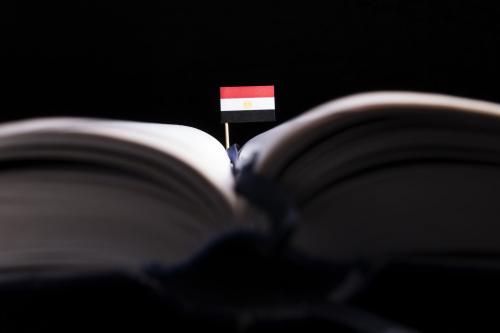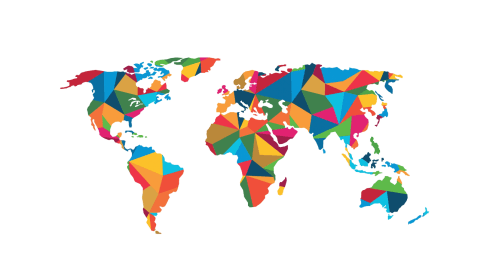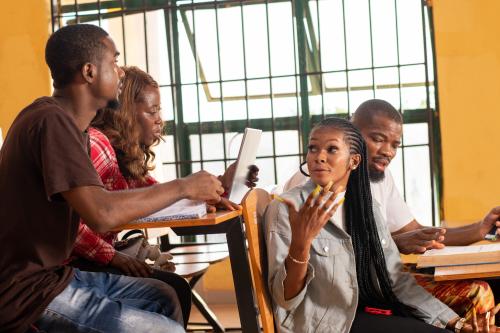When South African President Thabo Mbeki visited President Bush in June, he sought to silence any suggestion that non-Africans contribute troops to halt the genocide in Darfur. “It’s critically important that the African continent should deal with these conflict situations on the continent,” Mbeki declared. “And that includes Darfur. . . . We have not asked for anybody outside of the African continent to deploy troops in Darfur. It’s an African responsibility, and we can do it.”
Mbeki was reflecting the laudable desire of many African governments to chart their own future and clean up their own messes. Part of their motive is pride and self-reliance, though there may also be reluctance to admit that the nascent African Union (A.U.) still lacks the robust military capability to which it aspires. There may also be fear of antagonizing the Sudanese government with the prospect of Western intervention. Finally, as one African ambassador explained to me, following the Iraq war and Abu Ghraib, many African leaders are skeptical of U.S. intentions and the effectiveness of our forces in dealing with Muslim populations.
Whatever its mix of motives, the African Union has absolved reluctant Western countries of any responsibility to consider sending their own troops, and the U.S. government is undoubtedly grateful.
But the conspiracy of absolution is starting to unravel. At a recent press conference with Secretary of State Condoleezza Rice, Senegal’s Foreign Minister Cheikh Tidiane Gadio declared the situation in Darfur “totally unacceptable.” Moments earlier, Rice had stated: “We have worked hard, and we have been able to avert some of the humanitarian disaster that was forecast.” To the secretary’s evident irritation, Gadio lectured: “Madam Secretary, you know, you have to deal with the facts on the ground. . . . Those militias, they’re still very active . . . killing people, burning villages, raping women.”
Then Gadio exploded the myth—perpetuated by African and Western leaders alike—that the A.U. troops alone can stop the killing in Darfur. Senegal, with its long record of effective peacekeeping, is slated to join the A.U. force. Still, its foreign minister confessed: “We are totally dissatisfied with the fact that the African Union . . . has asked the international community to allow it to be an African solution to an African problem, and unfortunately the logistics from our own governments did not follow.” Now, he said, “The U.N. Security Council, the European Union, the African Union, the United States—we should all come together in a new way of dealing with the suffering of the people of Darfur . . . . We have to do something.”
By some estimates, the genocide in Darfur may have already claimed as many as 400,000 lives. Almost 2 million people are internally displaced, many languishing in crude camps where they are unable to plant crops or return to their burned-out villages. The government of Sudan, along with the militia it has armed and trained, is responsible for the genocide. While the pace of the killing has diminished in recent months, since there are few villages left to burn, the Sudanese government continues to support the militias that prey on vulnerable civilians, especially women. As Rice affirmed during her recent trip to Africa: “By our accounts, it was and is genocide.”
To date, the primary U.S. response has been to combat this genocide with humanitarian assistance. The United States and Europe also support A.U.-led negotiations to end the conflict, which preceded the genocide, and have partially funded the A.U. military mission. NATO is airlifting additional African troops into Darfur and will conduct map exercises for A.U. headquarters personnel.
The sum of this policy is to pass the military buck to the African Union. The A.U. guards this buck jealously and has done its best on the ground in Darfur. But the unfortunate truth is this: the African Union’s best is not yet good enough. Where it is deployed, the A.U. has performed heroically and greatly increased security for civilians. But the A.U. force is critically undermanned and has an impossibly weak mandate, limited to monitoring rather than enforcing the nonexistent ceasefire and protecting only those people facing an imminent threat within the force’s immediate vicinity. Because the Sudanese government retains primary responsibility for protecting the same civilians it is targeting, innocents continue to be killed with impunity.
More than one year after it took on the Darfur mission, the African Union has deployed only roughly 3,000 troops to cover an area the size of Texas. The A.U. has committed itself to increasing its force to 7,700 by late September, but U.S. officials doubt it will meet that target. Even if the A.U. force reaches full strength on time, it will still be too small to protect many of the displaced persons scattered across more than 100 camps and insecure areas. The A.U. is considering further increasing its force to 12,000 by the second quarter of 2006 but has made no firm decision to do so. The additional troops are not yet identified, much less available.
Since African governments alone cannot quickly muster the troops needed to halt the killing in Darfur, the rest of the international community cannot sidestep this mission. The International Crisis Group (ICG), an independent nongovernmental organization and a leading authority on Darfur, estimates that at least 12,000 to 15,000 NATO troops, with a new enforcement mandate, are needed to adequately protect civilians at risk. ICG suggests that NATO deploy a “bridging force” consisting of a brigade or two to bolster the A.U. mission. The force should include at least a small U.S. presence and remain in Darfur until African governments can deploy, with NATO assistance, at least 12,000 capable, well-equipped troops.
African Union resistance will be great, but may be mitigated if the NATO troops wear the blue helmets of the United Nations and receive the blessing of and funding from the U.N. Security Council. The government of Sudan will vigorously oppose a strengthened mandate and the inclusion of Western forces. China may use its Security Council veto to protect its oil partner, Sudan, from a U.N. force. But by what twisted logic should the perpetrators of genocide be allowed to engineer a veto of international action?
In the end, what matters isn’t merely a matter of NATO logistics or U.N. mechanics. The bigger issue is whether countries such as the United States and international groups such as NATO and the A.U. embrace an emerging international norm that recognizes the “responsibility to protect” innocent civilians facing death on a mass scale and whose governments cannot or will not protect them. This norm should prevail preferably with U.N. assent, but without it if necessary. That’s why NATO was right to act in Kosovo, even when Russia prevented U.N. authorization. If Sudan opposed NATO participation in Darfur, the alliance would have to make more of a military commitment than just back-stopping the A.U., but Sudan is hardly Serbia. Unless we are prepared to accept that African lives are less important than European lives, why would we do less in Sudan?
Never is the international responsibility to protect more compelling than in cases of genocide. Genocide is not a regional issue. A government that commits or condones it is not on a par with one that, say, jails dissidents, squanders economic resources or suppresses free speech, as dreadful as such policies may be. Genocide makes a claim on the entire world and it should be a call to action whatever diplomatic feathers it ruffles.
Americans and Europeans can make several excuses for continuing to watch from the sidelines, but none is entirely persuasive. U.S. and NATO forces are overstretched in Afghanistan and Iraq, but NATO announced last October that its Response Force has reached 17,000 troops and is “ready to take on the full range of missions.” Western military intervention in another Muslim country could create a new front for jihadist attacks. However, it is hard to see how allowing this fear to deter us from saving Muslim lives would salve anti-American hostility in the Muslim world.
U.S. and European officials have also hailed the new national unity government in Khartoum, which has incorporated southern rebel leaders, as offering hope that the genocide will soon end. This was an optimistic assumption even before the tragic death last weekend of John Garang, the popular southern Sudanese leader and newly inaugurated first vice president. Now it seems even less likely. The Khartoum government is still run by individuals complicit in this genocide. The newly incorporated southern leaders are unlikely to be informed of, much less able to stop, government-backed militia activity in Darfur.
The ultimate excuse for European and U.S. inaction remains the unconvincing notion that the African Union, by itself, can halt the killing quickly.
One day in the not distant future, the A.U. and sub-regional African organizations may indeed have the capacity, as Mbeki envisions, “to deal with conflict situations on the continent.” They are already doing much to bring peace to the conflict zones of West Africa and Burundi. (Wealthy donor countries can expedite the establishment of strong African intervention forces by investing even more in building five regional A.U. brigades.)
In the meantime, we should not lose sight of the fact that conflict and genocide are fundamentally different phenomena, even though they may occur in tandem as in Darfur and Rwanda. Genocide, as distinct from conflict, is a crime against all humanity regardless of race, religion or region, and it is the obligation of the entire world to stop it. In Rwanda, humanity—the U.N., Americans, Europeans and Africans—failed to halt the killing. In Darfur, despite the African Union’s belated best efforts, the world’s nations are still failing. This time, our failure lies in accepting the dubious proposition that halting genocide against Africans is solely “an African responsibility.”



Commentary
Why Darfur Can’t Be Left to Africa
August 7, 2005